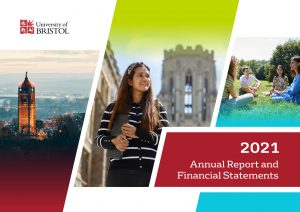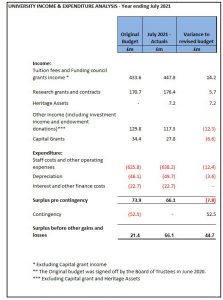 We recently published our Annual Report and Financial Statements for 2020/21.
We recently published our Annual Report and Financial Statements for 2020/21.
As always, this report goes much further than simply fulfilling the reporting requirements of the Office for Students, the Charity Commission and other bodies – it showcases the exceptional achievements of colleagues and students over the last academic year. These achievements are all the more impressive in light of the uniquely challenging circumstances that prevailed throughout 2020/21.
2020/21 highlights
Colleagues across our community worked tirelessly to implement large-scale measures and initiatives to help keep us all safe. We continued to deliver on our pledge to provide an education and student experience that enables all our students to thrive and achieve their full potential. While the pandemic necessitated an unprecedented emphasis on our digital education provision, we nevertheless maintained a focus on curriculum enhancement and continued our work to increase opportunities for students to develop valuable skills and experience.
Our community’s contribution to COVID-19 research has been outstanding, not just in biomedical disciplines but also in social sciences and the arts. We are equally proud of the research that our colleagues have conducted outside of the COVID sphere. This activity made a slow but sure recovery during the year, as further lockdowns and restrictions began to ease, and more colleagues were able to return to the facilities and interactions needed to resume their research.
Throughout the year, we forged significant new strategic international partnerships, consolidated our role as a key player in the South West economy, secured new funding for postgraduate research training, and continued to support innovation and entrepreneurship. Seven new University spinout companies were incorporated and, between them, our 81 active spinouts raised more than £628 million.
Elsewhere, we made continued progress on our gender and ethnicity pay gaps; work has begun on a four-year programme to modernise our critical IT infrastructure; we’ve made great progress in meeting net zero carbon target; and the refurbishment of Senate House is transforming the student experience, giving our students a new home of their own at the heart of our campus.
The Annual Report is full of more of your achievements – I encourage everyone to take a look!
2020/21 financial performance
The Report also sets out our financial performance for the last academic and financial year and provides a snapshot of our financial position on 31 July 2021. Overall, this position remains healthy and we achieved a surplus before other gains and losses of £66.1 million.
Every year, our operating income needs to be greater than our operating expenses so we can reinvest in the University’s long-term academic needs and research endeavour. The surplus generated in 2020/21 will help pay for important investments in new academic and Professional Services roles, the Digital Strategy, facility improvements and other key projects, such as a new community dental facility that will transform our dental education.

Several one-off developments contributed to the surplus, and these have been included in the table above. These include recognition of heritage assets gifted to the University of £7.4 million.
Income
Income from tuition fees and funding council grants increased notably since the original budget. We saw an 8% growth in total student population. As a result, tuition fee income totalled £349.8 million (£8 million higher than originally budgeted and an increase on our 2019/20 figure of £315.5 million). We are hugely appreciative of the efforts colleagues have made, and continue to make, in order to accommodate higher than planned undergraduate entrants. This follows two unprecedented recruitment cycles and the use of Teacher Assessed Grades by schools and colleges.
‘Research income’ was also higher than expected at £176.4 million, despite the reduction in UKRI Official Development Assistance (ODA) grants, and partly reflects the strength of new grant applications being made.
The University’s ‘Other income’ stream was most adversely impacted over the year, totalling £110.6 million (£19 million less than originally budgeted). This is principally due to the rent rebates and early tenancy releases we offered to students in university allocated halls, and our overall COVID-related support to students was among the most generous in the sector. Sports and catering income also came under pressure due to restrictions and lower footfall on campus.
Expenditure
The University’s staff costs and other operating expenditure for the year was £638.2 million – £12 million more than originally budgeted. We incurred significant additional costs in order to manage effectively the impact of COVID-19 on our learning and research. This includes COVID-related student support noted above, costs associated with delivery of blended learning, supporting early-career researchers, personal protective equipment and investment in our academic community, Professional Services and facilities, with additional posts approved to provide extra resource.
Of the £52.5-million contingency budget, £46 million related to significant uncertainty that existed over student numbers (particularly overseas students) and potential withdrawals. As noted above, this was not subsequently required as tuition fee income was higher than budgeted. The remaining contingency was released to offset the lower levels of residential income generated during the year owing to the exceptional rent rebates and early tenancy releases we gave to students in University-allocated accommodation.
Looking ahead
The future remains difficult to envision with any certainty. We are confident that prudent planning and the committed efforts of our colleagues will ensure that 2021/22 continues to show excellent results in our core activities of teaching and research.
The finalisation of the 2020 USS valuation in September will a significant impact on any surplus for 2021/22. This is expected to worsen the surplus forecast by £200 million and take us into a deficit. However, this is an accounting adjustment to reflect the fact that more payments will be required in the future, rather than increased payments this financial year.
Excluding this adjustment, the surplus before capital grants is forecast to be £5.3 million this financial year. This has been supported by strong tuition fee income (through increased student numbers) which is forecast to be £10.9 million above budget. Increased pay and non-pay costs have been allocated to support the extra student numbers.
Your efforts, both as individuals and as a community, have helped us navigate another difficult year and emerge in good shape. There remains a great deal of ambiguity ahead. Our external environment continues to evolve, the policy landscape remains potentially volatile, and we still don’t know how the pandemic will ultimately unfold. There remains £17.5 million included within the current forecast for contingency, with ongoing uncertainty over the potential impact of any future COVID restrictions.
With work ongoing to review and revise our institutional Vision and Strategy, the input of colleagues across the University will help ensure we’re able to move forward together positively and achieve even more success over the coming decade.
If you have any questions on this update, or on any other matter, do please contact me at coo@bristol.ac.uk.
